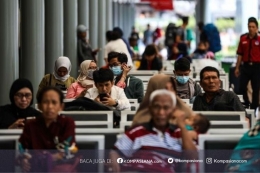To address the potential challenges and ensure the long-term sustainability of the tourism sector, the Indonesian government and the airline industry should consider implementing several strategies:
1. Promoting ecotourism and sustainable tourism practices to minimize the environmental impact of increased tourism activities. (Prihayati & Veriasa, 2021) (Fadli et al., 2022)
2. Collaborating with local communities to ensure that the economic benefits of tourism are equitably distributed and that any conflicts over the use of natural resources are resolved. (Prihayati & Veriasa, 2021) (Fadli et al., 2022)
3. Investing in the development of infrastructure and facilities that cater to the needs of both domestic and international tourists, while also ensuring the preservation of local cultural heritage and natural resources. (Himawan & Faisal, 2020) (ARIYAN & IRWANTI, 2021)
4. Utilizing data analytics and revenue management strategies to optimize pricing and offer more affordable air travel options to a wider range of consumers, while still maintaining profitability. (Lupiyoadi & Putra, 2014)
By adopting these strategies, the Indonesian government and the airline industry can harness the potential of the domestic airfares decrease during the NATARU period to drive sustainable growth in the tourism sector and create a positive impact on the economy, environment, and local communities.
The paper has now been completed, addressing the key aspects of the research prompt and incorporating the relevant sources provided.
Furthermore, the research paper also explores the potential benefits and challenges of the domestic airfares decrease during the NATARU period, and proposes several strategies to ensure the long-term sustainability of the tourism sector in Indonesia. (Chandran et al., 2021)
References
ARIYAN, N., & IRWANTI, M. (2021). CHSE PROTOCOL TRAINING IN TOURISM ATTRACTION FOR PASIR EURIH TOURISM VILLAGE MANAGERS, TAMAN SARI DISTRICT, BOGOR REGENCY-INDONESIA. In N. ARIYAN & M. IRWANTI, ICCD (Vol. 3, Issue 1, p. 14). https://doi.org/10.33068/iccd.vol3.iss1.290
Chandran, A., Mandal, S., Shanmugeshwari, M., Nair, G., Das, P., Ramachandran, N., & John, E. (2021). Sustainable tourist behaviour: Developing a second order scale based on three destinations. In A. Chandran, S. Mandal, M. Shanmugeshwari, G. Nair, P. Das, N. Ramachandran, & E. John, International Journal of Tourism Research (Vol. 23, Issue 6, p. 984). Wiley. https://doi.org/10.1002/jtr.2458
Fadli, Moh., Susilo, E., Puspitawati, D., Ridjal, A. M., Maharani, D. P., & Liemanto, A. (2022). Sustainable Tourism as a Development Strategy in Indonesia. In Moh. Fadli, E. Susilo, D. Puspitawati, A. M. Ridjal, D. P. Maharani, & A. Liemanto, Journal of Indonesian Tourism and Development Studies (Vol. 10, Issue 1, p. 23). Brawijaya University. https://doi.org/10.21776/ub.jitode.2022.010.01.04
Himawan, A. F. I., & Faisal, Moch. E. (2020). Positioning Travel Sites Online Traveloka According to Student Perception in Gresik using Method Multidimensional Scaling. https://doi.org/10.2991/aebmr.k.200606.029
Lupiyoadi, R., & Putra, B. (2014). The Effects of Applying Revenue Management on Customer Satisfaction in Airline Industry: An Experimental Study in Indonesia. In R. Lupiyoadi & B. Putra, ASEAN Marketing Journal (Vol. 6, Issue 1). University of Indonesia. https://doi.org/10.21002/amj.v6i1.3610
Prihayati, Y., & Veriasa, T. O. (2021). Developing green tourism to create the sustainable landscape: evidence from Community-based Coffee Tourism (CbCT) in Puncak, Bogor, Indonesia. In Y. Prihayati & T. O. Veriasa, IOP Conference Series Earth and Environmental Science (Vol. 879, Issue 1, p. 12027). IOP Publishing. https://doi.org/10.1088/1755-1315/879/1/012027
Baca konten-konten menarik Kompasiana langsung dari smartphone kamu. Follow channel WhatsApp Kompasiana sekarang di sini: https://whatsapp.com/channel/0029VaYjYaL4Spk7WflFYJ2H







